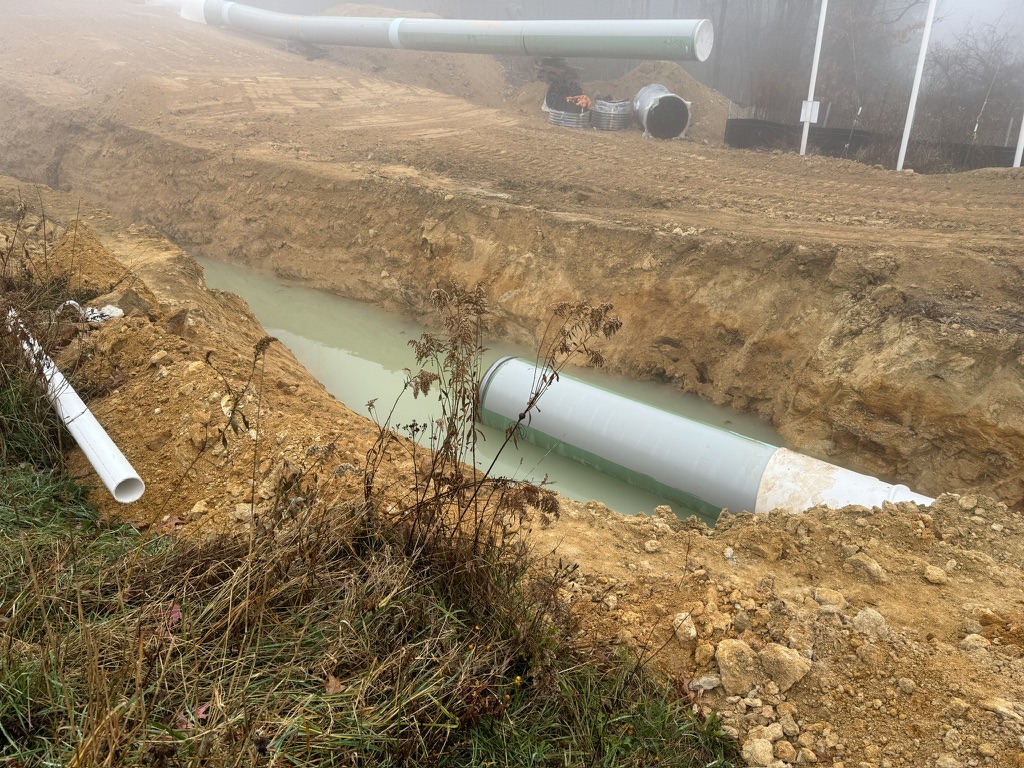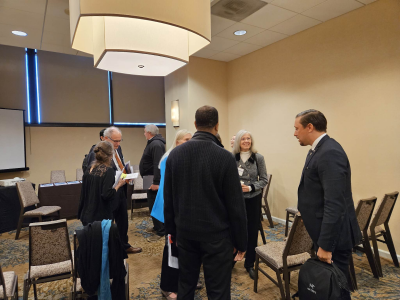Front Porch Blog
FERC approves 3-year extension for MVP Southgate
Despite overwhelming public opposition, the Federal Energy Regulatory Commission granted a three-year extension of Mountain Valley Pipeline’s certificate for their MVP Southgate, which is still missing key permits that would allow it to pollute our air and water. Our fight continues!
Along the route of the Mountain Valley Pipeline, citizen monitors have watched a frenzy of workers hurriedly lower sun-bleached and degraded pipe into trenches, burying as much material as possible. Although safety concerns led the agency tasked with pipe safety, the Pipeline and Hazardous Materials Safety Administration, to issue a consent agreement, the agreement has not brought peace of mind. The menacing speed at which pipe is meagerly spot-coated, lowered and buried is causing deep concern across the region.
Unsafe materials can mean unsafe conditions should the project ever become operational. That basic hope that developers are acting safely, using best practices for processes and using the most effective materials available seems less and less likely. Sedimentation runoff into waterways continues, and citizen monitors work hard to document and report instances of runoff into creeks, dust plumes from construction sites and construction workers disobeying the established conditions of their permits.
It is a reality that residents didn’t ask for and continue to oppose — and their dedication to keep their communities safe remains incredible.

Pipe sits in standing water in a trench on Bent Mountain, Va. Photo by Dan Radmacher
Updates on the Mountain Valley Pipeline
Massive amount of variance requests submitted by MVP
As Mountain Valley Pipeline attempts to hurriedly finish construction, significant safety concerns remain — and new ones have emerged. The concerns are often revealed within the electronic docket “CP16-10” for the pipeline at www.ferc.gov, which serves as a public-facing library for the project.
Variance requests are changes that the developers make from their original environmental compliance plans, and they require individual approval from the Federal Energy Regulatory Commission. MVP has submitted hundreds of variance requests: from changing crossing methods, to adding roads, to adjusting locations for bore sites. A variance submitted on Aug. 4 stood out for two reasons — the potential hazard it described, and the speed at which commissioners approved it.
The Friday filing on the docket — the electronic public library on FERC’s website — revealed a serious routing difficulty that should have been resolved during the permitting process and now poses a safety risk. MVP’s filing was a request to add water to a combustible “gob” pile located close to the pipeline’s Gauley River crossing in West Virginia. FERC staff approved the request in a mere six hours, leaving little time for the public to review, process and potentially respond.
This mad dash for variance requests has continued since August, with requests to use water from nearby streams, change construction impacts to wetlands from temporary to permanent and build new access roads, among the dozens of recent variances. This reinforces suspicions that the project was poorly planned and executed at each step.
Safety concerns continue as federal agencies weigh in
On Aug. 11, PHMSA weighed in on the situation by expressing significant safety concerns about MVP. PHMSA officials indicated they spent over 200 days in the field observing MVP’s developers. In their “Notice of Proposed Safety Order,” the agency said MVP requires a “comprehensive evaluation to identify and remediate integrity issues, mitigate the risk and protect public safety, property and the environment.”
September saw U.S. Rep. Morgan Griffith, R-Va., weigh in as he assisted Franklin County, Virginia, with a grant from PHMSA for emergency services training related to the pipeline. Community members in surrounding counties also encouraged their boards of supervisors to look more closely at evacuation routes, the capacity of existing emergency services and the need for training on the specialized response needed, should there ever be a leak or explosion.
This amplification of the project’s cumulative risks — degraded pipe, landslide-prone soil, fragile geology — continued through a series of community events like the Aug. 26 and 27 “We Are These Mountains” event in Monroe County, Virginia, POWHR’s “How We Protect Us” monthly series, ARTivism printmaking workshops and the Appalachian Voices-curated exhibit “Environment at Risk.”

Environment at Risk exhibition featured over 40 artists — read more here. Photo by Jessica Sims
Thanks to that continued public pressure, PHMSA reached a consent agreement with MVP on Oct. 3. Although the unprecedented consent agreement for Mountain Valley Pipeline mandates important new steps for testing whether pipe is corroded, it largely leaves the public in the dark as to what corrective measures are required to keep the public safe when pipe coating is found to be compromised. Exposure to the outdoors can degrade the fusion-bonded epoxy coating, which can lead to an increased risk of break or rupture. Impacted residents asked both in writing and directly to PHMSA staff for more community engagement, determination of a new impact radius and evacuation zone, and increased protection from geohazards, as well as an in-person route visit.

Community members and allies attend the PHMSA conference. Photo by Appalachian Voices

Residents conclude a meeting with PHMSA staff. Photo by Jessica Sims
Decisions looming at the Federal Energy Regulatory Commission
Earlier this year, MVP had requested to increase their transportation rates because of the increased costs of the project, essentially asking for permission to raise costs for consumers because of MVP’s own bad planning. That the Mountain Valley Pipeline is years behind schedule and construction costs have ballooned to an estimated $6.6 billion dollars is due to the company’s insufficient planning and choice of route, deficient permit applications and lax construction practices. The resulting violations, fines, permit vacations and consent orders are all of the company’s own making.
FERC commissioners held an open comment period on this amendment request earlier this year, where thousands of members of the public weighed in, in addition to Virginia Del. Sam Rasoul, who represents a community directly affected by the pipeline. The commission voted to allow this amendment during their Dec. 19 monthly meeting, again granting unwarranted permission for MVP to change their own circumstances at will.
Also on the agenda for the December FERC meeting was MVP’s request to extend their Certificate of Public Convenience and Necessity for the proposed Southgate extension by an astonishing three additional years. The request to renew the certificate came in as the original certificate expired and received significant public opposition during the comment period this summer from over 38,000 community leaders, grassroots organizations, and members of the public, in addition to scores of state legislators, North Carolina Gov. Roy Cooper and 28 members of Congress.
Notably, construction never started on Southgate, and the air permit for its Virginia compressor station necessary water permit from North Carolina were denied in 2021. Developers have not demonstrated the project’s viability and should not be given more time to leave potentially impacted communities in peril, and yet FERC has granted the project more time. We will vehemently oppose any new permit applications.
As Appalachian Voices looks to the end of 2023 and beginning of 2024, we will continue to support monitoring efforts and increased safety and public transparency related to MVP and MVP Southgate. We are deeply grateful for the inspiring communities who continue to oppose both the Mountain Valley Pipeline and its Southgate extension and we remain in solidarity with you.
PREVIOUS
NEXT
Related News

Leave a comment
Your email address will not be published. Required fields are marked *
4 responses to “Communities continue to seek safety measures for Mountain Valley Pipeline”
-
Thank you @Margaret for being in the exhibition! Your embroidery of a Yellow Finch was beautiful and inspiring to those (like you) fighting MVP
-
@Susan thank you! Here is a toolkit to use to help take action, #1 is for residents along the route but #s 2 & 3 are for any/all of us to do: https://docs.google.com/document/d/1dCQnMkyEim9PZXUtY6u_w7f8CFxb7_Xt5jF3Q4JHnIw/edit
-
thank you for your work. What can I do? I can write letters, etc. Any folks in particular I should contact?
-
“Environment At Risk” was a wonderful exhibition and I was glad to be part of it.

Leave a Comment